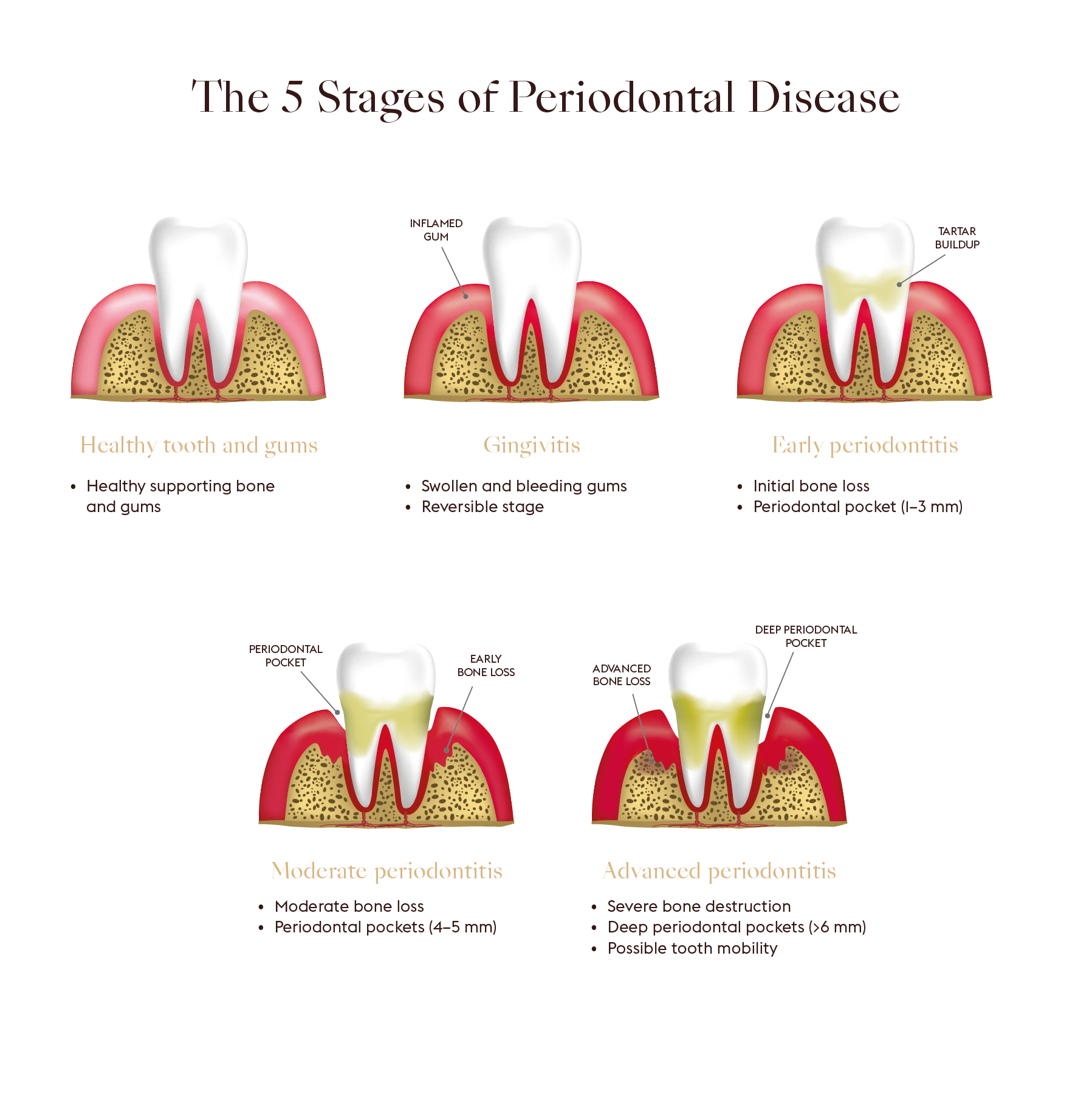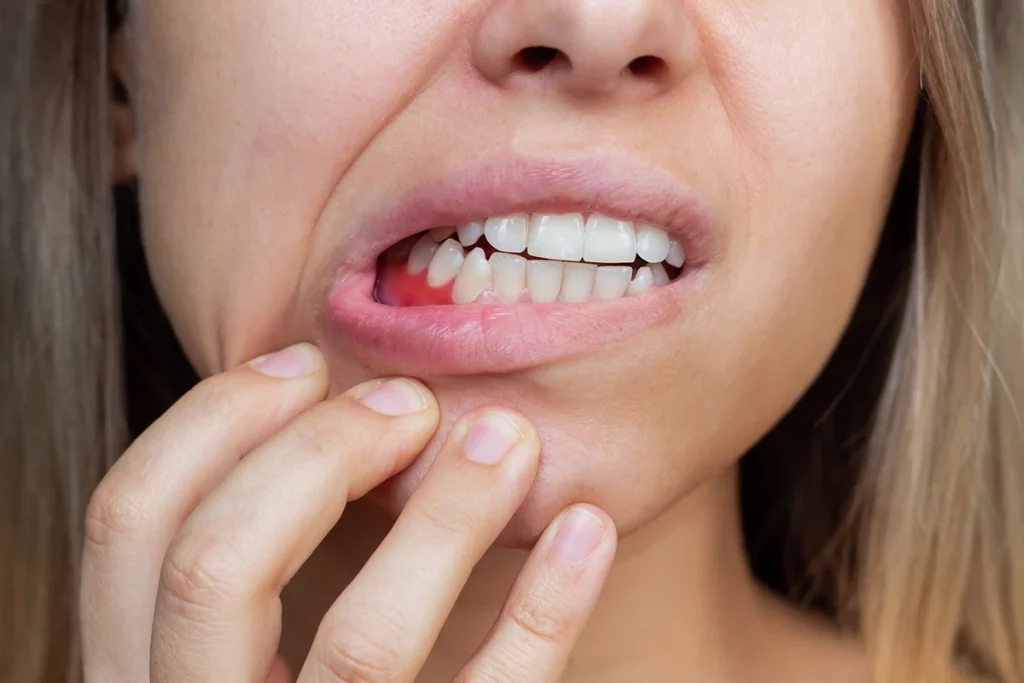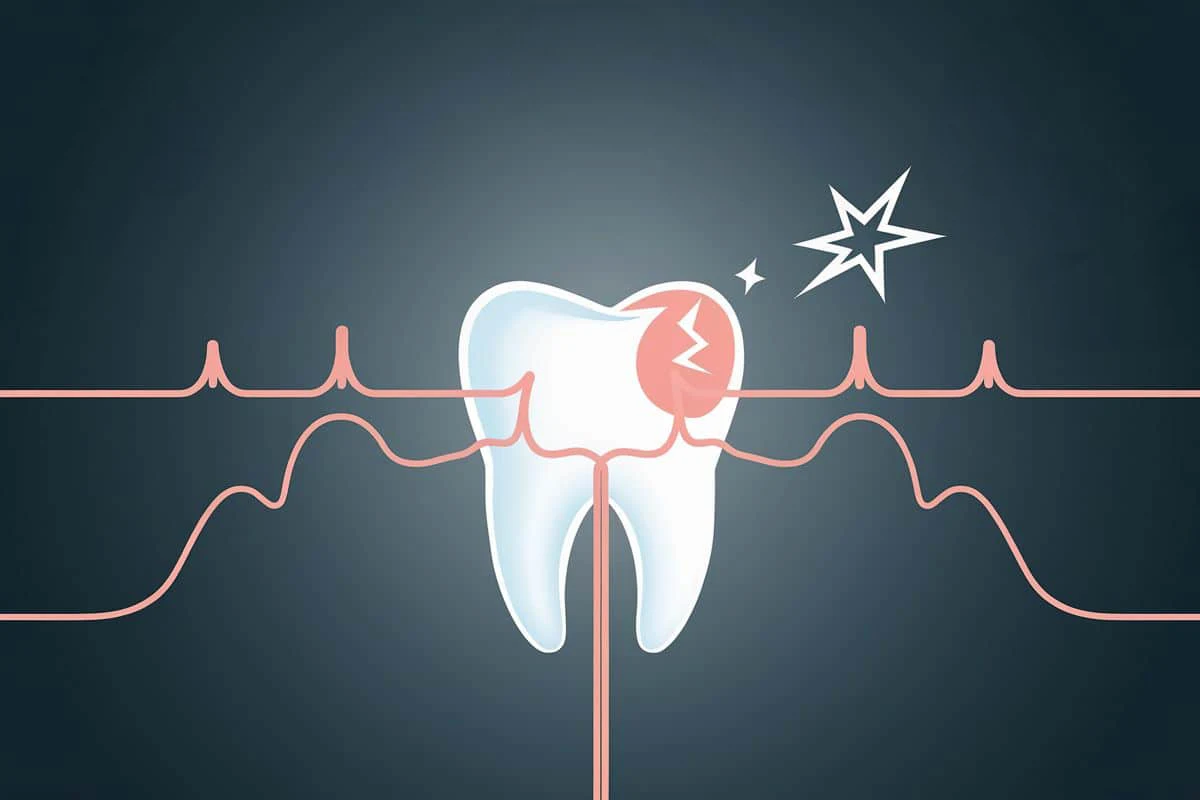Spitting up a bit of blood after brushing can be unsettling. Some immediately fear a serious disease, while others barely notice it. So why do gums bleed? What could be causing it? And most importantly, what can you do about it?
In Europe, almost two out of three people notice their gums bleeding—usually right after brushing. So if it happens to you, whether in Geneva or elsewhere, you’re far from alone. In most cases, this bleeding is a sign of gum inflammation (gingivitis) or periodontal disease—but other factors can also play a role.
Table of Contents
What to Do When Your Gums Bleed
Why Are My Gums Bleeding?
Poor Oral Hygiene
When plaque and tartar build up at the gum line, they irritate and inflame the gums. Inflamed gums swell, become fragile, and bleed easily when you brush or floss. This is the most common cause of gingivitis.
Periodontitis
If inflammation goes unchecked, it spreads below the gum line into the supporting structures—cementum, periodontal ligament, and alveolar bone. That’s periodontitis.
How common is it?
Global Burden of Disease data (2021) shows 20–50 % of adults worldwide have active periodontitis, and 8–19 % suffer from severe forms. In Switzerland, nearly half of adults over 45 show bone loss on X-rays.
Watch for these warning signs:
- Deep pockets (4 mm or more), receding gums, slight tooth mobility, and persistent bad breath.
Recent risk factors:
- Poorly controlled diabetes (2–3 times higher risk)
- Regular smoking (up to 70 % more bone loss)
- Chronic vitamin D deficiency, linked to higher gum inflammation in a 2024 review from the University of Zurich
Why it matters:
Periodontitis is now recognized as a co-risk factor for heart disease and type 2 diabetes. The European Federation of Periodontology’s 2023 guidelines recommend screening from age 35—especially for smokers and diabetics.

Pregnancy
Hormonal shifts during pregnancy make gums extra sensitive. Rising estrogen and progesterone can trigger “pregnancy gingivitis,” where gums inflame and bleed more easily.
Vitamin Deficiencies
Lack of vitamins—especially B2, B3, B6, B9, B12, C, or D—weakens gum tissues. Vitamin C is key: low levels often lead to more bleeding, particularly in children, and usually improve once the deficiency is addressed.
Medication Side Effects
Certain drugs can increase gum bleeding, notably anticoagulants (aspirin, clopidogrel, heparin). Other medications—like acetaminophen, amiodarone, amoxicillin, paroxetine, ketoprofen, zolpidem, enalapril, ramipril, or furosemide—may also play a role, especially in women over 50.
What to Do When Your Gums Bleed
Improve Your Oral Care
Mild, occasional bleeding often clears up with thorough brushing twice a day and daily flossing. Need a refresher? Check out our guide to proper brushing technique.
See a Dentist
You can’t remove tartar at home—only a professional cleaning (scaling and root planing) will clear hardened biofilm. Geneva University Hospital’s 2023 protocol recommends:
- Digital periodontal assessment to measure pocket depth.
- High-frequency ultrasonic scaling + hand instrumentation under local anesthetic for pockets ≥ 4 mm
- Antiseptic irrigation (0.12 % chlorhexidine or 0.5 % hypochlorite)—studies show systemic antibiotics add no benefit except for pockets > 6 mm in back teeth.
- Custom hygiene plan: sonic toothbrush with soft bristles, interdental brushes, and 3–6-month recall visits.
Progress tracking
At each follow-up, the dentist measures Bleeding on Probing (BOP) by gently running a small periodontal probe along the gum line. This WHO-recognized clinical index reliably gauges gum inflammation. A reduction of at least 30 % in BOP after three months shows the treatment is working well and greatly reduces the risk of relapse.
In Geneva
Dental Geneva follows this protocol in line with the cantonal integrated health guidelines. These clinical steps are the most evidence-based way to halt bone loss and restore pain-free gums—without overusing antibiotics.
Fix Nutritional Gaps
Your doctor can test for vitamin C, D, or B-group deficiencies and recommend supplements. Clinical reports show gum bleeding often improves quickly once levels normalize.

Review Your Medications
If no local cause is found, consider your meds. Under medical supervision, adjusting the dose or switching drugs can sometimes stop the bleeding.
Need personalized advice?
At your next visit to Dental Geneva, feel free to ask our hygienists or dentists about your bleeding gums. We’ll take the time to assess your situation and tailor a care plan just for you.
See you soon!


